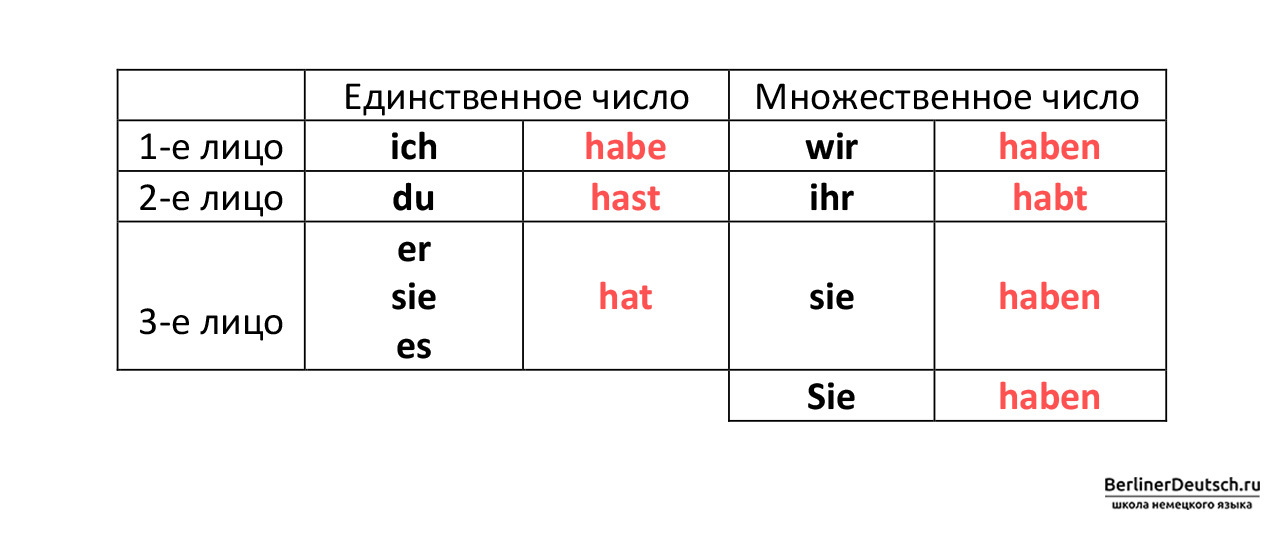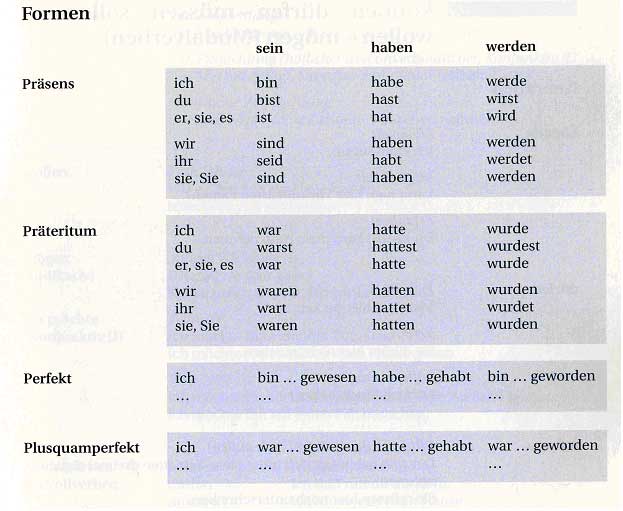
Глаголы haben, sein и werden в форме перфект. Hilfsverben im Perfekt. YouTube
„Sein" und „haben" im Allgemeinen. Die Verben „sein" und „haben" sind wichtige Verben in der deutschen Sprache. Sie werden in verschiedenen Situationen, sowie als Hilfsverb zur Bildung von zusammengesetzten Zeitformen benutzt.

Haben Sein Oder Werden Unregelm 228 223 Ige Verben Verben Und Deutsch Lernen Gambaran
What must be considered when forming 'werden, haben, sein' in the present tense?. The German verbs sein and werden are both irregular or strong, producing special forms in their conjugation.In contrast, the verb haben is partly regular (see the table below for variations) and follows the conjugation pattern of other weak German verbs. This explanation treats these three verbs separately.

Haben, sein oder werden? Deutsch lernen, Unregelmäßige verben, Verben
The 3 German auxiliary verbs are sein (to be), haben (to have), for the past and present tenses and werden (to become) for the future tense. They sometimes stand on their own but are most commonly used with other verbs. All 3 are irregular verbs, which mean they don't follow a set pattern when conjugated, and it's unfortunately just a case.

(PDF) Die Hilfsverben haben, sein, werden Deutsch Verben Nicole Balczo Academia.edu
Die Verben sein, haben und werden. „Ich bin. Aber ich habe mich nicht. Darum werden wir erst.". Die Verben sein, haben und werden kann man als Vollverb, als Hilfsverb und als Funktionsverb benutzen, die Verben sein und haben zusätzlich als sogenanntes Modalitätsverb. Vollverb: Das Verb wird wie ein normales Verb benutzt.

Спряжение глаголов sein, haben и werden (глаголы особого спряжения) в немецком языке
The grammar for this week combines information from week 6 (Modal Verbs), week 9 (The Regular Verb) and week 10 (Verbs-sein, haben, werden).. Last week, in week 10, I introduced these three important verbs in the present tense. Let us delve a little into conjugating the past tense for the verbs sein (to be), haben (to have) and werden (to become).

Спряжение глаголов sein, haben, werden Немецкий язык онлайн. Изучение, уроки.
Haben is the auxiliary verb for the verbs stehen, sitzen and liegen in the perfect tenses. Er hat auf der Straße gestanden. Du hast auf dem Sofa gesessen. Die Kinder haben auf dem Boden gelegen. German speakers in southern Germany, Austria and Switzerland often ignore this rule and use the auxiliary sein.

Видео урок Präteritum von haben, sein und werden
Freie Übung. Conjugation - Complete the gaps with the present simple of the verbs in brackets. ich (haben) [I have]|first person singular → habe. wir (sein) [we are]|first person plural → sind. du (sein) [you are]|second person singular → bist. er (haben)

jármű kritizál Agglegény future tense of sein vadászgép Tegyük fel Erő
A Foundation Course in Reading German. Unit 1: Basics. 4. The Verbs Haben and Sein. The verbs sein (to be) and haben (to have) are two of the most common verbs in German and therefore you must memorize their forms. Sein and haben are the infinitive forms of the verbs. "Infinitive forms" are important to know since dictionaries list verbs in.

Learn German "haben and sein verbs. YouTube
German Verb Conjugations: Sein, Haben & Werden Gap-fill exercise from www.ielanguages.com

Bijles Duits grammatica 4 haben, sein, werden onregelmatige werkwoorden YouTube
Grammar 'haben', 'sein' und 'werden' Infinitiv Präsens: Die Kopulaverben: 'sein, werden, bleiben' Die Kopulaverben nehmen eine Stellung zwischen den Hilfsverben und den Vollverben ein. Sie verbinden das Subjekt des Satzes mit einem Nomen im Nominativ oder einem Adjektiv in eine…

Duits haben, sein, werden in de verleden tijd YouTube
Westend61 / Getty Images. By. Hyde Flippo. Updated on January 31, 2019. The two most important German verbs are haben (to have) and sein (to be). As in most languages, the verb "to be" is one of the oldest verbs in German, and therefore one of the most irregular. The verb "to have" is only slightly less irregular, but no less vital to surviving.

Haben, sein & werden Mevrouw Duits uitleg en oefeningen
Even though the usual answer is that most verbs use the auxiliary verb haben in the perfect tense (however watch for common exceptions stated below), sometimes both are used — depending on what part of Germany you're from. For instance, northern Germans say Ich habe gesessen, whereas in southern Germany and Austria, they say Ich bin gesessen.

Hilfsverben _ haben sein werden _ Lü… English ESL worksheets pdf & doc
Die Hilfsverben haben, sein und werden gehören zu den wichtigsten Verben der deutschen Sprache. Ich zeige dir mit Hilfe von "Eselsbrücken", wie man sie richt.

Duits haben, sein und werden YouTube
Sin embargo los verbos irregulares si que cambian su raíz con cada nueva conjugación.. Vas a ver a continuación que los tres verbos : SEIN, HABEN y WERDEN, son verbos irregulares. La única particularidad que tienen es que el verbo varía con cada persona y no sigue a una regla general, por lo que te toca memorizarlos bien, recuerda repetirlos una y otra vez para dominar la pronunciación.

تصريف الافعال haben sein werden wissen nehmen YouTube
In deze les leer je de onregelmatige werkwoorden haben, sein en werden kennen. Je leert hoe je deze werkwoorden in de tegenwoordige tijd kunt vervoegen.

Haben & Sein Conjugation Song Learn German with Herr Antrim
The German auxiliary verbs are ' haben ' (have), ' werden ' (will), and ' sein ' (be). Note, however, that these can also be main verbs depending on their usage. In contrast to English grammar, there are no verbs in the German language that can be only auxiliary verbs. „Wir hatten uns ein neues Auto gekauft." (We had bought a.